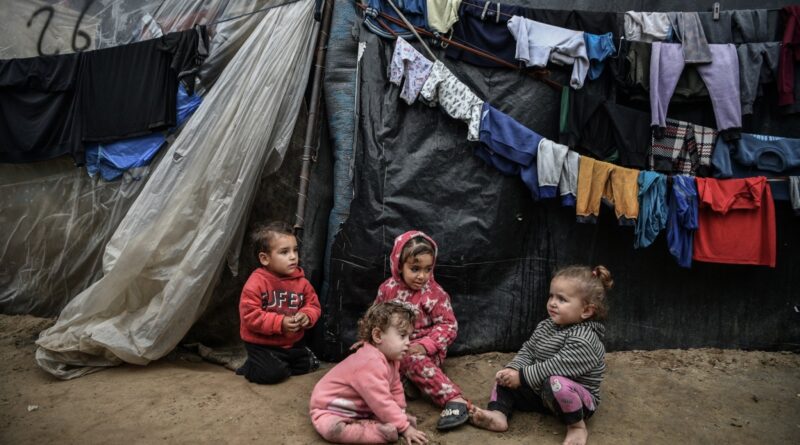26 EU states demand ‘immediate’ halt in Gaza fighting
An alarming lack of food, surging malnutrition and the rampant spread of disease could spark an explosion in child deaths in Gaza, the United Nations has warned.
20 weeks into Israel’s war against Hamas in Gaza, UN agencies warned that food and safe water had become “incredibly scarce” in the Palestinian territory, adding that virtually all young children had infectious illnesses.
“The Gaza Strip is poised to witness an explosion in preventable child deaths which would compound the already unbearable level of child deaths in Gaza,” said Ted Chaiban, deputy head of humanitarian action at the UN children’s agency UNICEF.
At least 90 percent of children under five in Gaza are affected by one or more infectious diseases, according to a joint assessment by the UN agencies for children, food and health.
70 percent had had diarrhoea in the two weeks prior to the assessment, marking a 23-fold increase compared to the 2022 baseline.
“Hunger and disease are a deadly combination,” World Health Organization emergencies director Mike Ryan said in a statement.
“Hungry, weakened and deeply traumatised children are more likely to get sick, and children who are sick, especially with diarrhoea, cannot absorb nutrients well,” he said.
“It’s dangerous, and tragic, and happening before our eyes.”
Since the start of the war, Gaza has been plunged into a nutrition crisis, with outside aid severely restricted.
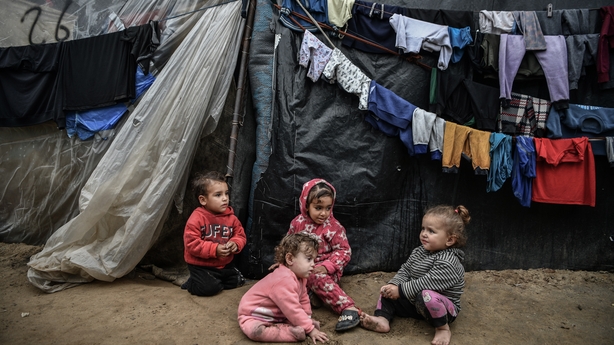
The UN assessment indicated that more than 15 percent of children under the age of two in northern Gaza – one in six – were acutely malnourished, while three percent were suffering from life-threatening severe wasting.
“As the data were collected in January, the situation is likely to be even graver today,” the UN agencies warned.
In southern Gaza, five percent of children under two were acutely malnourished, according to the assessment.
Before the war, only 0.8 percent of children under five in Gaza were considered acutely malnourished, the UN agencies pointed out.
“Such a decline in a population’s nutritional status in three months is unprecedented globally,” they said.
‘Immediate humanitarian ceasefire’
All EU countries except Hungary have joined a call for an “immediate humanitarian pause” in the Gaza war, foreign policy chief Josep Borrell has said.
The European Union has struggled for a united response on Israel’s military operation following the 7 October attack by Hamas.
But Mr Borrell said foreign ministers from 26 states had agreed a statement calling for “an immediate humanitarian pause that would lead to a sustainable ceasefire”.
The EU countries also reiterated their calls for Israel not to launch an assault on the Gaza city of Rafah, which has become the main shelter zone in the stricken territory.
Hungary is a staunch supporter of Israel and has frequently refused to go along with EU statements seen as critical of the country.
Other EU nations such as Germany have been reluctant until now to call for an “immediate” halt in Israel’s operations. It has not wanted to be seen backing any move that could limit Israel’s right to defend itself.
Earlier, the EU warned Israel against launching an offensive in Rafah that ministers said would create a disaster for the roughly 1.5 million refugees crammed into the city on the southern edge of Gaza.
“An attack on Rafah would be absolutely catastrophic … it would be unconscionable,” Minister for Foreign Affairs Micheál Martin said before a meeting with foreign ministers from the 27 EU member states in Brussels.
“Over 1.5 million people are crowded into a very small corner of Gaza. They’re weary, they are exhausted, they have nowhere else to go – how can anyone contemplate adding to that trauma?” he said.
Israel is preparing to mount a ground invasion of Gaza’s southernmost city, which it has called a last bastion of Hamas control after nearly five months of fighting.
Meanwhile, 14 patients have been evacuated from a Gaza hospital that has been raided by Israeli troops, the Gaza health ministry and the United Nations said, as Israel denied its military operations had stopped the hospital from functioning.
The sides gave conflicting accounts of the situation at Nasser Hospital in Khan Younis, Gaza’s second-largest, with Israel denying an assertion by the Gaza ministry’s spokesperson that its forces had detained the hospital director.
The ministry said the evacuated patients, including five who required kidney dialysis and three intensive care cases, were moved from the hospital to others in Gaza thanks to efforts by the World Health Organization, a UN agency.
“There are still more than 180 patients and 15 doctors and nurses inside Nasser,” WHO Director-General Tedros Adhanom Ghebreyesus later said in a post on X.
“The hospital is still experiencing an acute shortage of food, basic medical supplies, and oxygen. There is no tap water and no electricity, except a backup generator maintaining some lifesaving machines,” he said, urging Israel to allow safe and sustained access to Nasser to continue lifesaving efforts.
His post contained a video showing a WHO trauma surgeon, Dr Athanasios Gargavanis, wearing a blue UN flak jacket and helmet as he walked through dark corridors inside the hospital during the evacuation mission on Sunday.
The video showed medics in similar protective gear carrying patients on stretchers by flashlight.
“We managed to move 14 patients, eight of them are non-walking patients and the rest are walking patients. Two of them needed ventilation. We have a patient with tracheostomy and a patient who’s intubated with a head injury,” Mr Gargavanis said.
The UN humanitarian office said the Israeli military operation in the hospital complex was ongoing.
Nasser Hospital is the latest health facility to become a theatre of war in the conflict between Israel and Hamas, now in its fifth month.
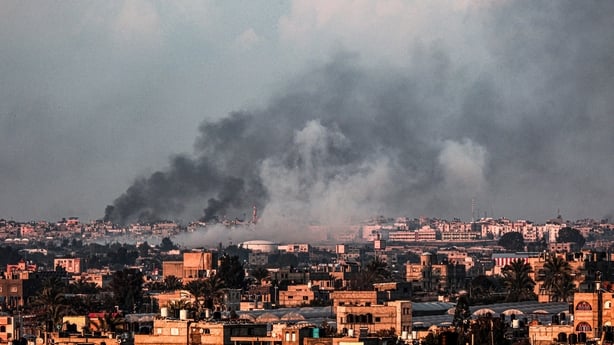
Ashraf Al-Qidra, spokesperson for the Gaza health ministry, said Israeli forces had detained 70 staff and volunteers at the hospital, including its director Dr Nahed Abu Taeema.
The Israeli army denied Abu Taeema had been detained and said it was not aware of 70 other arrests.
The army had previously said it had apprehended hundreds of Hamas militants who were hiding in Nasser Hospital, some posing as medical staff, and had released images of weapons it said were found there.
“IDF troops conducted activities against terror infrastructure and terrorist operatives at the Nasser Hospital,” a spokesperson said.
“In addition, the IDF operated in cooperation with the hospital director and the medical team in order to enable the continued functioning of the hospital. The troops also engaged in a dialogue with the director a few days ago.”
Reuters was unable to reach Abu Taeema by phone.
COGAT, an Israeli Defence Ministry liaison agency involved in coordinating aid deliveries to Gaza, said Nasser Hospital had remained functional at all times during the army’s raids.
“We facilitated humanitarian aid and supplies to the hospital and coordinated a @UN team to evacuate the patients,” COGAT said on X.
It described the army’s actions as “a precise activity against the Hamas terror organisation at the Nasser Hospital, with a key objective to ensure that the Nasser hospital continues its operations”.
It listed items it said had been delivered to the hospital with its help, including diesel fuel, food and drinking water, a replacement generator and medicines donated by the WHO.
Hospitals in northern Gaza had been partially operating in recent weeks but were now at risk of shutting down again, the Gaza health ministry said.
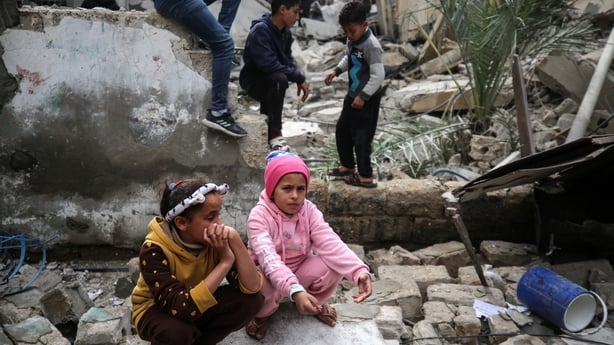
Israel sets Ramadan deadline for offensive in Rafah
Israel has threatened to invade Rafah by the start of Ramadan if Hamas does not return the remaining hostages by then.
With prospects for truce talks dimmed, the United States and other governments, as well as the United Nations, have issued increasingly urgent appeals to Israel to call off its planned offensive on Rafah.
“The world must know, and Hamas leaders must know – if by Ramadan our hostages are not home, the fighting will continue everywhere, including the Rafah area,” Benny Gantz, a retired military chief of staff, told a conference of American Jewish leaders in Jerusalem yesterday.
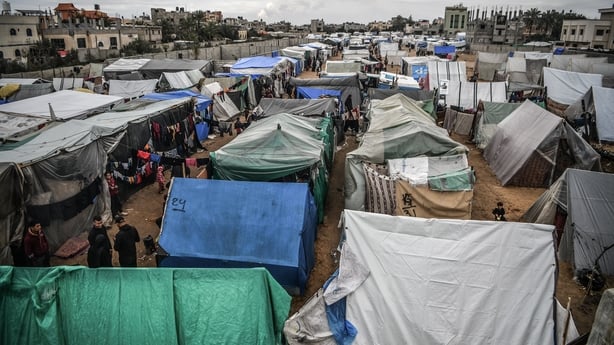
“Hamas has a choice. They can surrender, release the hostages and the civilians of Gaza can celebrate the feast of Ramadan,” added Mr Gantz, a member of the three-person war cabinet.
Ramadan, the Muslim holy month, is expected to begin around 10 March.
Mr Gantz said the offensive will be carried out in coordination with US and Egyptian partners to “minimise the civilian casualties as much as possible”.
For weeks, international mediators have sought to broker a truce-for-hostages deal that would pause fighting for six weeks.
Israeli Prime Minister Benjamin Netanyahu has played down the possibility of an impending breakthrough, calling Hamas’s demands “delusional”.
Even if a deal is struck, he insists the campaign to eliminate Hamas from Gaza will not be completed until clearing Rafah.
“Deal or no deal, we have to finish the job to get total victory,” he said at the Jerusalem conference yesterday.
With international pressure piling on Israel, the UN’s top court opened a week of hearings today examining the legal consequences of the country’s 57-year occupation of Palestinian territories.
Read more:
Latest Middle East stories
Hamas has meanwhile threatened to suspend its involvement in any ceasefire negotiations unless relief supplies reach Gaza’s north, where aid agencies have warned of looming famine.
Yesterday morning, dozens of Israelis blocked Gaza-bound aid trucks from entering through the Nitzana crossing with Egypt, AFP reporters and the Palestinian Red Crescent Society said.
Gazans say they are going so hungry they are grinding animal feed into flour.
“My children are starving, they wake up crying from hunger. Where do I get food for them?” one northern Gazan woman told AFP.
The UN agency for Palestinian refugees said nearly three in four people are drinking contaminated water.
“The speed of deterioration in Gaza is unprecedented,” it said.
After a week-long siege, the largest hospital still functional in Gaza is no longer operational, according to the World Health Organization.

